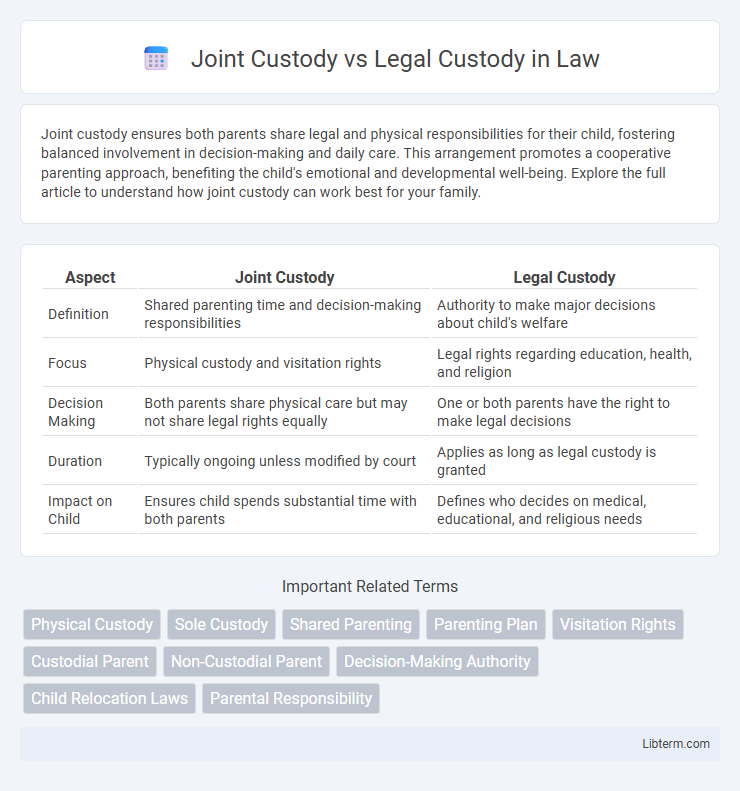Joint custody ensures both parents share legal and physical responsibilities for their child, fostering balanced involvement in decision-making and daily care. This arrangement promotes a cooperative parenting approach, benefiting the child's emotional and developmental well-being. Explore the full article to understand how joint custody can work best for your family.
Table of Comparison
| Aspect | Joint Custody | Legal Custody |
|---|---|---|
| Definition | Shared parenting time and decision-making responsibilities | Authority to make major decisions about child's welfare |
| Focus | Physical custody and visitation rights | Legal rights regarding education, health, and religion |
| Decision Making | Both parents share physical care but may not share legal rights equally | One or both parents have the right to make legal decisions |
| Duration | Typically ongoing unless modified by court | Applies as long as legal custody is granted |
| Impact on Child | Ensures child spends substantial time with both parents | Defines who decides on medical, educational, and religious needs |
Understanding Custody: Joint vs Legal
Joint custody refers to both parents sharing physical and/or legal responsibilities, allowing them to make decisions together regarding the child's upbringing. Legal custody specifically denotes the authority to make major decisions about the child's education, healthcare, and welfare, which can be awarded jointly or solely to one parent. Understanding the distinction between joint custody and legal custody helps clarify parental rights and responsibilities in child custody arrangements.
Defining Joint Custody
Joint custody is a legal arrangement where both parents share the rights and responsibilities of raising their child after separation or divorce. It includes joint legal custody, allowing both parents to make significant decisions about the child's education, health care, and welfare, and joint physical custody, which refers to the child living with each parent for substantial periods. Defining joint custody accurately ensures clarity in parental roles and promotes cooperative co-parenting.
What is Legal Custody?
Legal custody refers to the authority granted to a parent or guardian to make important decisions regarding a child's education, healthcare, religion, and general welfare. Unlike physical custody, which determines where the child lives, legal custody involves the right and responsibility to guide the child's upbringing and key life choices. Joint legal custody means both parents share these decision-making rights, regardless of the child's primary residence.
Key Differences Between Joint and Legal Custody
Joint custody involves both parents sharing physical and decision-making responsibilities for the child, promoting active involvement in daily care and major life choices. Legal custody specifically refers to the right to make important decisions about the child's upbringing, education, healthcare, and religious training, which can be sole or joint. The key difference lies in joint custody encompassing both physical and legal aspects, while legal custody pertains solely to decision-making authority.
Factors Courts Consider in Custody Decisions
Courts consider factors such as the child's best interests, including emotional and physical well-being, parental stability, and the ability to cooperate in joint custody arrangements. Legal custody decisions often weigh each parent's capacity to make informed decisions regarding education, healthcare, and religious upbringing. The court evaluates evidence of each parent's involvement and the potential impact on the child's development when determining custody types.
Pros and Cons of Joint Custody
Joint custody allows both parents to share decision-making responsibilities and physical time with their child, promoting balanced parental involvement and supporting the child's emotional development. It can reduce feelings of exclusion and foster cooperation but may lead to conflicts if parents have poor communication or vastly different parenting styles. Challenges include coordinating schedules and managing disputes, which can impact the child's stability if not handled effectively.
Pros and Cons of Legal Custody
Legal custody grants a parent the authority to make significant decisions regarding a child's education, healthcare, and religious upbringing, ensuring their active role in shaping the child's future. One advantage is that it provides clear legal rights and responsibilities, fostering stability and consistency in critical decision-making processes. However, legal custody can also lead to conflicts between parents when disagreements arise, potentially requiring court intervention to resolve disputes and increasing emotional stress for the family.
How Custody Types Affect Parenting Rights
Joint custody grants both parents shared decision-making authority regarding major aspects of their child's welfare, including education, health care, and religious upbringing, ensuring balanced parental involvement. Legal custody primarily defines the right to make critical decisions for the child, often held by one parent, which can limit the other parent's influence in important areas. Understanding the distinction impacts parenting rights by determining each parent's ability to participate actively in the child's life and the scope of their authority in legal and daily matters.
Modifying Custody Agreements
Modifying custody agreements requires a clear understanding of the differences between joint custody and legal custody to ensure the child's best interests are prioritized. Joint custody involves shared physical or legal responsibilities, while legal custody specifically refers to decision-making authority regarding the child's education, healthcare, and welfare. Courts typically require substantial changes in circumstances to approve modifications, emphasizing the importance of detailed documentation and compliance with jurisdictional family law statutes.
FAQs About Custody Arrangements
Joint custody refers to both parents sharing decision-making responsibilities, while legal custody specifically involves the authority to make important decisions about a child's welfare, education, and healthcare. Frequently asked questions about custody arrangements often address how parenting time is divided, the impact on child support, and the legal rights each parent holds under joint versus sole legal custody. Understanding the distinctions between physical custody, legal custody, and joint custody is crucial for parents navigating family court proceedings.
Joint Custody Infographic

 libterm.com
libterm.com